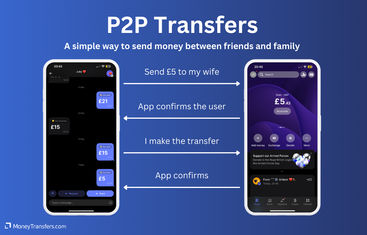What are P2P (Peer-to-Peer) Payments?
P2P payments or transfers (Peer-to-Peer payments) is a way of transferring funds using digital platforms. Usually, these transfers are made using specialized apps and services, such as Revolut.
These services connect one user to another using a secure connection. This allows them to skip any intermediaries and offer free transfers.
Here, we'll explain P2P transfers and how they work. We'll also look at the top P2P apps, fees, and speed.
Search Now & Save On Your Transfer
P2P Payments Explained
What does P2P mean?
A peer-to-peer transfer, also known as a P2P payment, refers to instances where money is sent and received between trusted contacts such as friends, family, colleagues, and acquaintances , usually through an app and without any intermediaries.
Typically executed online through a money transfer provider website or mobile apps, peer-to-peer transactions facilitate the sending of funds from one person to another, via the internet or mobile network.
A few examples of common peer-to-peer payments include:
Splitting a dinner bill between friends
Paying monthly rent to a landlord
Dividing domestic payments among household members
Sharing the cost of a purchase with family members
P2P apps changed my life. I remember opening a 'Mondo' account (before they switched to Monzo). Since then, every single one of my family members and friends has an account with them. It made everyone's life much easier; my dad can send me money from the EU, I can send money to my wife whenever she needs it, and my wife sends money to her nephews in Latvia, with minimal to no fees and no awkward money talks.Artiom Pucinskij
How do peer-to-peer transfers work?
In most cases, peer-to-peer transfers are deemed more convenient than traditional bank transfers.
Users can simply select the recipient from their contact list, rather than having to enter bank details.

Different apps work differently, but in general, all you need is for both of you to have the same app installed and have each other email or number.
In some cases, you can send a payment link without another person having one. For a more detailed explanation (for the techies out there), Monzo explains it in their article.
For example
You attend a work lunch with 2 colleagues, both of whom have agreed to split the bill with you. Rather than asking each guest at the table to pay using cash, you pay for the entire meal on your card.
When you get back to the office, you divide the bill by 3 and request this amount from each colleague using a peer-to-peer money transfer app.
Your colleagues will receive a notification for the requested amount, logging into the app or online platform by entering a secure password, PIN code, or fingerprint ID, and entering the amount due.
You receive money from both colleagues instantly, without needing to provide or request any bank details.
Some peer-to-peer payment platforms also function as a digital wallet (for example Wise), meaning funds can be stored and managed from the P2P account; while other platforms will deposit funds directly to the linked bank account or card.
What is UPI and is it different to P2P payments?
Unified Payment Interface or UPI is similar to P2P payments, its as fast and secure payment option used in India for money transfers.
Popular P2P payment apps
First made popular by digital payment provider PayPal, the concept of a peer-to-peer transfer has gathered momentum since. Here's a list of the most popular P2P payment apps.
With a Wise multi-currency account, you can hold multiple international and local currencies and send them to each other (as long as both of you have the accounts).
In terms of P2P payments, it offers a seamless experience between mobile and desktop versions and carries no fees.
It doesn't have fancy tools like Revolut, but if you're planning to convert currencies and send them abroad, it's a great app to have.
Our video review of Wise

Revolut supports multiple currencies and offers P2P payments between Revolut account holders. All you need is the recipient's contact details and them to have a Revolut app.
It's particularly useful if you have kids (due to their under-18 account) and want to pocket money to them hassle-free without any fees.
If you're paying someone abroad, however, the exchange rates can be a bit messy and confusing as well as they charge a conversion fee on the weekends.
Cash App is one of the more popular options in the US. You can send and receive money between friends and family even without the app.
You can easily fund your account with any debit card. Each Cash App user gets assigned a $cashtag which is used to send the payments.
In reality, as a P2P app, it's very similar to any other app, the key differences being the availability and features.
Cash App offers free savings features, it allows for deposits via ACH, checks, and paper money deposits and lets you set up recurring deposits.
It is a convenient app for day-to-day use if you live in the US (similar to Monzo in the UK).
Zelle is a US-only app and is built for USD payments. It is similar to other providers like Venmo and Cash App in terms of P2P payments.
However, the biggest differentiator is the simplicity of the app and multiple integrations.
It can be integrated with many banking, meaning that if your bank supports it, you don't even need the app, you can send payments right within your banking app.
If it doesn't, you can simply download the app and use it as usual.
We've added Google Pay to the list because of its ecosystem.
In terms of features, it offers everything you'd expect from a P2P app; convenient payments, free P2P transfers, requests, and an app.
The main reason to use it is if you're fully ingrained in the Google ecosystem and don't need another app on your phone.
All transactions will sync up in one place making it easier for you to keep track.
By now you've probably used PayPal at least once in your life, and chances are you already have an account with them. PayPal is a global P2P payment service, largely used for online shopping, payments, and money transfers.
PayPal payments are usually instant (with a few exceptions where they can flag your transaction) but otherwise, it's a convenient way to make transfers between friends and family.
However, all this comes with higher fees compared to other apps.
If you're making a domestic payment funded by a card you will likely pay the fees, if you're making an international transfer, the fees are even worse (especially compared to the alternatives).
We recommend using PayPal in case you have a balance on it and can use that to send local payments.
Peer-to-peer transfer costs
One of the biggest incentives for customers to use a peer-to-peer transfer service over traditional banking methods is the fact they offer a free service between contacts based in the same country as you.
Additional fees may apply to international payments and payments funded by credit card.
How long do peer-to-peer transfers take?
Usually, payments are instant. But again, this will depend on the service you are using and where you need to send the money, but generally speaking, another overarching draw of peer-to-peer payments is the provider’s ability to instantly request and deposit funds between known and trusted contacts.
Another speed consideration to make is the withdrawal method.
For example
If you send money via PayPal, the recipient won't be able to spend it unless they withdraw it to the bank account.
This adds extra time to the whole process. However, if you use something like Revolut or Cash App (with a free debit card), the process is almost always instant.
Help & FAQ
Get answers to the most common questions asked when sending money abroad. Covers costs, fees and the best way to compare.
Let's recap: What are P2P payments?
P2P payments or transfers are a way of sending money to friends and family using mobile and desktop apps without any intermediaries.
As peer-to-peer payments grow in popularity, especially among Gen Zers, we encourage everyone to research and give P2P apps a go. A recent report anticipated that the global P2P payment market is expected to generate $2,271.41 billion transactions by 2026.
If you're looking to send money abroad with a P2P app, we'd suggest finding a specialized provider instead, be it for speed, cost, or support. Use our form below to get the best money transfer service for your needs.
Find the best service to send money abroad
Sources & further reading
Related Content


Contributors

April Summers




.svg)









